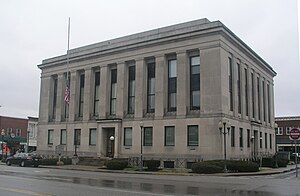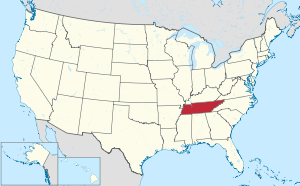Sumner County, Tennessee
Sumner County | |
|---|---|
 Sumner County Courthouse in Gallatin | |
 Location within the U.S. state of Tennessee | |
 Tennessee's location within the U.S. | |
| Coordinates: 36°28′N 86°28′W / 36.47°N 86.46°W | |
| Country | |
| State | |
| Founded | November 1786 |
| Named for | Jethro Sumner[1] |
| Seat | Gallatin |
| Largest city | Hendersonville |
| Area | |
• Total | 543 sq mi (1,410 km2) |
| • Land | 529 sq mi (1,370 km2) |
| • Water | 14 sq mi (40 km2) 2.5% |
| Population | |
• Estimate (2015) | 175,989 |
| • Density | 303/sq mi (117/km2) |
| Congressional district | 6th |
| Website | www |
Sumner County is a county located in the U.S. state of Tennessee. As of the 2010 census, the population was 160,645.[2] Its county seat is Gallatin,[3] and its largest city is Hendersonville. The county is named for American Revolutionary War hero General Jethro Sumner.
Sumner County is part of the Nashville-Davidson–Murfreesboro–Franklin, TN Metropolitan Statistical Area.
History
Sumner County was created in 1786, when Tennessee was still part of North Carolina. The county had been inhabited by Native Americans for centuries, as evidenced by Mississippian period mounds still visible at Castalian Springs. Longhunters traveled to the area as early as the 1760s, following Indian paths through the area. By the early 1780s, several outposts had been erected, most notably Mansker's Station, built by Kasper Mansker at modern Goodlettsville, and Bledsoe's Station, built by Isaac Bledsoe at Castalian Springs.[1]
Geography

According to the U.S. Census Bureau, the county has a total area of 543 square miles (1,410 km2), of which 529 square miles (1,370 km2) is land and 14 square miles (36 km2) (2.5%) is water.[4]
Sumner County is located in Middle Tennessee on the state's northern border with Kentucky. The Cumberland River was important in early trade and transportation, as it flows into the Ohio River to the west. Sumner County is in the Greater Nashville metropolitan area.
Adjacent counties
- Davidson County (southwest)
- Macon County (east)
- Robertson County (west)
- Trousdale County (southeast)
- Wilson County (south)
- Allen County, Kentucky (northeast)
- Simpson County, Kentucky (northwest)
State protected areas
- Bledsoe Creek State Park
- Cragfont State Historic Site
- Gallatin Steam Plant Wildlife Management Area
- Old Hickory Wildlife Management Area (part)
- Rock Castle State Historic Site
- Taylor Hollow State Natural Area
- Wynnewood State Historic Site
Demographics
| Census | Pop. | Note | %± |
|---|---|---|---|
| 1800 | 4,616 | — | |
| 1810 | 13,792 | 198.8% | |
| 1820 | 19,211 | 39.3% | |
| 1830 | 20,569 | 7.1% | |
| 1840 | 22,415 | 9.0% | |
| 1850 | 22,717 | 1.3% | |
| 1860 | 22,030 | −3.0% | |
| 1870 | 23,711 | 7.6% | |
| 1880 | 23,625 | −0.4% | |
| 1890 | 23,668 | 0.2% | |
| 1900 | 26,072 | 10.2% | |
| 1910 | 25,621 | −1.7% | |
| 1920 | 27,708 | 8.1% | |
| 1930 | 28,622 | 3.3% | |
| 1940 | 32,719 | 14.3% | |
| 1950 | 33,533 | 2.5% | |
| 1960 | 36,217 | 8.0% | |
| 1970 | 56,106 | 54.9% | |
| 1980 | 85,790 | 52.9% | |
| 1990 | 103,281 | 20.4% | |
| 2000 | 130,449 | 26.3% | |
| 2010 | 160,645 | 23.1% | |
| 2015 (est.) | 175,989 | [5] | 9.6% |
| U.S. Decennial Census[6] 1790-1960[7] 1900-1990[8] 1990-2000[9] 2010-2014[2] | |||

As of the census[11] of 2000, there were 130,449 people, 48,941 households, and 37,048 families residing in the county. The population density was 246 people per square mile (95/km²). There were 51,657 housing units at an average density of 98 per square mile (38/km²). The racial makeup of the county was 91.49% White, 5.78% Black or African American, 0.29% Native American, 0.66% Asian, 0.03% Pacific Islander, 0.80% from other races, and 0.96% from two or more races. 1.76% of the population were Hispanic or Latino of any race.
In 2000 there were 48,941 households out of which 36.30% had children under the age of 18 living with them, 61.10% were married couples living together, 10.80% had a female householder with no husband present, and 24.30% were non-families. 20.30% of all households were made up of individuals and 7.20% had someone living alone who was 65 years of age or older. The average household size was 2.64 and the average family size was 3.04.
In the county, the population was spread out with 26.30% under the age of 18, 8.00% from 18 to 24, 30.70% from 25 to 44, 24.30% from 45 to 64, and 10.70% who were 65 years of age or older. The median age was 36 years. For every 100 females there were 95.90 males. For every 100 females age 18 and over, there were 92.30 males.
The median income for a household in the county was $46,030, and the median income for a family was $52,125. Males had a median income of $36,875 versus $25,720 for females. The per capita income for the county was $21,164. About 6.20% of families and 8.10% of the population were below the poverty line, including 10.50% of those under age 18 and 10.00% of those age 65 or over.
Education
Board of Education
Schools in the county are governed by the Sumner County Board of Education. The twelve-member group consists of eleven elected representatives from each of the eleven educational districts in the county, as well as the Director of Schools. The members serve staggered four-year terms; the Director serves under contract with the Board of Education. The board conducts monthly meetings that are open to the public.
Schools
Elementary schools (K–5)
- Anderson Elementary School
- Beech Elementary School
- Benny Bills Elementary School
- Bethpage Elementary School
- Clyde Riggs Elementary School
- Gene Brown Elementary School
- George Whitten Elementary School
- Guild Elementary School
- H. B. Williams Elementary School
- Howard Elementary School
- Indian Lake Elementary School
- Lakeside Park Elementary School
- Madison Creek Elementary School
- Millersville Elementary School
- Nannie Berry Elementary School
- North Sumner Elementary School
- Oakmont Elementary School
- Portland Gateview Elementary School
- Station Camp Elementary School
- Union Elementary STEM School (year-round school)
- Vena Stuart Elementary School
- Walton Ferry Elementary School
- Watt Hardison Elementary School
- Westmoreland Elementary School
- Wiseman Elementary School
Middle schools (6–8)
- Ellis Middle School
- Hawkins Middle School
- Joe Shafer Middle School
- Knox Doss at Drakes Creek Middle School
- Portland East Middle School
- Portland West Middle School
- Rucker-Stewart Middle School
- Station Camp Middle School
- T. W. Hunter Middle School
- Westmoreland Middle School
- White House Middle School
High schools (9–12)
- Beech Senior High School
- E. B. Wilson Night School
- Gallatin High School
- Hendersonville High School
- Portland High School
- Station Camp High School
- Westmoreland High School
- White House High School
Magnet schools
- Merrol Hyde Magnet School (K–12)
Alternative schools
- R. T. Fischer Alternative School (K–12)
Private schools
- Saint John Vianney Catholic Elementary School (K–8)
- Southside Christian School (K–12)
- Sumner Academy (K–8)
- John Paul II High School
- Aaron Academy (K-12)
Colleges
Communities
Cities
- Gallatin (county seat)
- Goodlettsville (partly in Davidson County)
- Hendersonville
- Millersville (partly in Robertson County)
- Mitchellville
- Portland (partly in Robertson County)
- White House (small part in Robertson County)
Town
Census-designated places
Unincorporated communities
Notable people
Submarine innovator Horace Lawson Hunley was born in Sumner County on June 20, 1823. On October 15, 1863, Hunley, along with seven other crewmen, drowned while making a test dive in Charleston Harbor near Fort Pinckney. Following his death, the submarine, unofficially known as the "Fish Boat," was renamed the H.L. Hunley in his honor. On the night of February 17, 1864, the Hunley sank the USS Housatonic, making it the first submarine to sink an enemy vessel.
R&B National Recording Artist Nacole Rice was born in Sumner County.[12]
Freak show performer "Camel Girl" Ella Harper was born in and later returned to Sumner County.
See also
References
- ^ a b Dee Gee Lester, "Sumner County," Tennessee Encyclopedia of History and Culture. Retrieved: 7 April 2013.
- ^ a b "State & County QuickFacts". United States Census Bureau. Retrieved 7 December 2013.
- ^ "Find a County". National Association of Counties. Retrieved 7 June 2011.
- ^ "2010 Census Gazetteer Files". United States Census Bureau. 22 August 2012. Retrieved 14 April 2015.
- ^ "County Totals Dataset: Population, Population Change and Estimated Components of Population Change: April 1, 2010 to July 1, 2015". Retrieved 2 July 2016.
- ^ "U.S. Decennial Census". United States Census Bureau. Retrieved 14 April 2015.
- ^ "Historical Census Browser". University of Virginia Library. Retrieved 14 April 2015.
- ^ Forstall, Richard L., ed. (27 March 1995). "Population of Counties by Decennial Census: 1900 to 1990". United States Census Bureau. Retrieved 14 April 2015.
- ^ "Census 2000 PHC-T-4. Ranking Tables for Counties: 1990 and 2000" (PDF). United States Census Bureau. 2 April 2001. Retrieved 14 April 2015.
- ^ Based on 2000 census data
- ^ "American FactFinder". United States Census Bureau. Retrieved 14 May 2011.
- ^ Biography, Nacole Rice official site. Retrieved: 7 April 2013.


